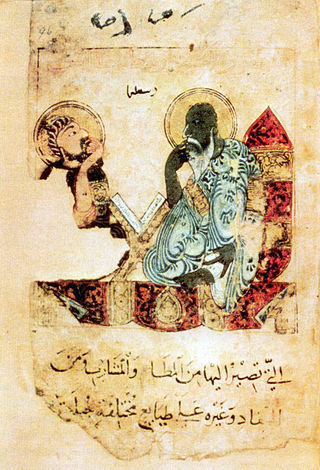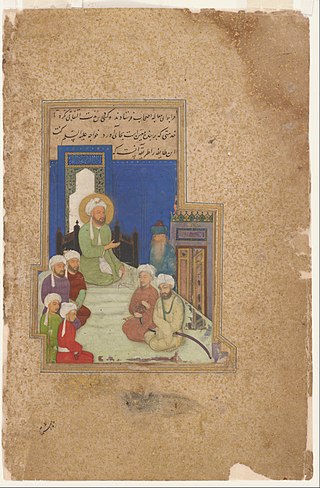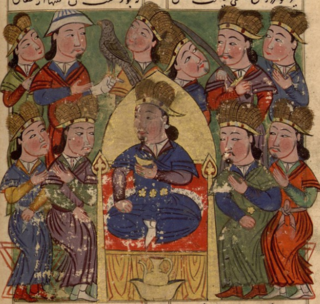See also
| | This biography related to medicine in Iran is a stub. You can help Wikipedia by expanding it. |
Amin al-Din Rashid al-Din Vatvat was a 13th-century Persian physician.
The National Library of Medicine possesses an untitled Persian treatise on general preparation of food and drink which gives the author as Amin al-Din Rashid Vatvat and specifies that it was composed for Arghun Khan who ruled from 1284 to 1291CE.
A much shorter treatise on the same topic, also written by the order of Arghun Khan, is preserved in another untitled manuscript where the author is given as Amin al-Din Rashid al-Din Otaji. A Persian tabular treatise on the same topic written by Amin al-Din Otaji and dedicated to Mahmud Ghazan Khan (who ruled from 1295 to 1304CE) is preserved in two copies.
For both these treatises see C.A. Storey, Persian Literature: A Bio-Bibliographical Survey, volume II, part 2: E. Medicine (London: Royal Asiatic Society, 1971), p. 217 no. 373.
The treatise now at the National Library of Medicine, with author given as Amin al-Din Rashid Vatvat, is presumably by the same author whose name appears as Amin al-Din Rashid al-Din Otaji in other manuscripts.
This Amin al-Din Rashid al-Din Vatvat cannot be the same person as Rashid al-Din Muhammad al-Umari Vatvat who lived in the 12th century and wrote in the name of the governor of Khvarazm (a northern province of Persia) to two prominent physicians in Baghdad, Abu al-Barakat al-Baghdad (d. 1165CE) and Ibn al-Tilmidh asking them to recommend a physician from amongst their students who could take over al-Jurjani's position as court physician following his death around 1136CE. For this earlier Rashid al-Din al-Vatvat, see Lutz Richter-Bernburg, Persian Medical Manuscripts at the University of California, Los Angeles: A Descriptive Catalogue, Humana Civilitas, vol. 4 (Malibu: Udena Publications, 1978), p. 3.

The House of Wisdom, also known as the Grand Library of Baghdad, was a major Abbasid-era public academy and intellectual center in Baghdad. It was one of the world's largest public libraries during the Islamic Golden Age, and was founded either as a library for the collections of the fifth Abbasid caliph Harun al-Rashid in the late 8th century or as a private collection of the second Abbasid caliph al-Mansur to house rare books and collections of poetry in the Arabic language. During the reign of the seventh Abbasid caliph al-Ma'mun, it was turned into a public academy and a library.
Rashīd al-Dīn Ṭabīb was a statesman, historian and physician in Ilkhanate Iran.

Arghun Khan was the fourth ruler of the Mongol empire's Ilkhanate, from 1284 to 1291. He was the son of Abaqa Khan, and like his father, was a devout Buddhist. He was known for sending several embassies to Europe in an unsuccessful attempt to form a Franco-Mongol alliance against the Muslim Mamluks in the Holy Land. It was also Arghun who requested a new bride from his great-uncle Kublai Khan. The mission to escort the young Kököchin across Asia to Arghun was reportedly taken by Marco Polo. Arghun died before Kököchin arrived, so she instead married Arghun's son, Ghazan.

Jabril ibn Bukhtishu, also written as Bakhtyshu, was an 8th-9th century physician from the Bukhtishu family of Assyrian Nestorian physicians from the Persian Academy of Gundishapur. He was a Nestorian and spoke the Syriac language.
Aḥmad ibn ‘Imād al-Dīn, Ahmad ibn Imad ad-Din was a Persian physician and alchemist. He was probably from Nishapur in the 11th century.

Jamal al-Din Muhammad ibn Muhammad ibn Muhammad ibn Fakhr al-Din al-Razi, also written al-Aqsara'i, was a 14th-century Muslim Iranian physician. He became known as Aqsara'i because he moved to Aqsara region of what is now Turkey.

Ghiyāth al-Dīn ʿAlī ibn Ḥusayn ibn ʿAlī Amīrān Iṣfahānī was a fifteenth-century Persian physician and scientist from Isfahan, Iran. He was, in the words of Daniel Beben, 'a polymath in the service of several of the Timurid governors of Badakhshān in the second half of the 15th century' CE. Little is known of him beyond the works attributed to him.
Jalal al-Din Muhammad al-Isfahani was a 19th-century Persian physician from Isfahan.

Gaykhatu was the fifth Ilkhanate ruler in Iran. He reigned from 1291 to 1295. His Buddhist baghshi gave him the Tibetan name Rinchindorj which appeared on his paper money.
Ziya' al-Din Nakhshabi was a 14th-century Persian physician and Sufi living in India. He died in 1350.
Yuhanna ibn Bukhtishu was a 9th-century Persian or Syriac physician from Khuzestan, Persia.
Sindhi literature is the collection of oral and written literature in the Sindhi language in prose and poetry. The Sindhi language of the province of Sindh in Pakistan is considered one of the oldest languages of ancient India, and influenced the language of Indus Valley inhabitants. Sindhi literature has developed over a thousand years.

A bimaristan or simply maristan,, known in Arabic also as dar al-shifa is a hospital in the historic Islamic world. It origins can be traced back to Sassanian Empire prior to the Muslim conquest of Persia.
Safīna-yi Tabrīz is an important encyclopedic manuscript from 14th century Ilkhanid Iran compiled by Abu'l Majd Muhammad ibn Mas'ud Tabrizi between 1321 and 1323.

Öljaitü, also known as Mohammad-e Khodabande, was the eighth Ilkhanid dynasty ruler from 1304 to 1316 in Tabriz, Iran. His name means 'blessed' in the Mongolian language.

Jāmiʿ al-tawārīkh is a work of literature and history, produced in the Mongol Ilkhanate. Written by Rashid al-Din Hamadani at the start of the 14th century, the breadth of coverage of the work has caused it to be called "the first world history". It was in three volumes and published in Arabic and Persian versions.

Buqa was a Mongol lord and chancellor who was instrumental in sweeping Arghun to power as the fourth Il-Khan of Iran in 1284 and became his chief minister (vizier) and advisor, succeeding Shams ad-Din Juvayni whom Arghun had executed.
Rashid al-Din or Rashid ad-Din, under various transliterations including Rashîduddîn, may refer to:

Rab'-e Rashidi is the site of a historic building complex including a school and a workshop for producing books that was constructed in the early 14th century during the reign of Ghazan, a ruler of the Ilkhanid dynasty, in the northeastern part of the city of Tabriz, Iran. Other buildings later replaced these, and the site is now ruined, but it is the original complex that gives the site its fame. It was founded and richly endowed by Rashid al-Din Hamadani, the chief minister of Ghazan Khan. Rashid al-Din sought to gather the most famous intellectuals of his time in fields of philosophy, science and medicine. The establishment began to decline after the execution of Rashid al-Din in 1318, though his son Ghiyas al-Din ibn Rashid al-Din led a revival in the 1330s until his own murder in 1336.
Amin al-Din, also transcribed Amin ad-Din and Amin ud-Din, is an Arabic name meaning "Trustee of the Faith". It is the name of: